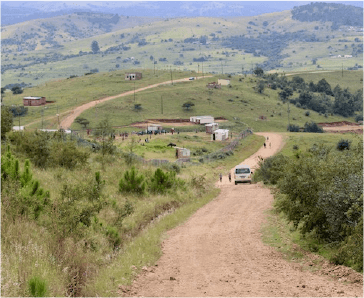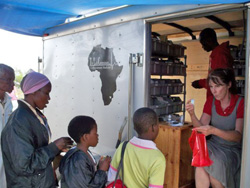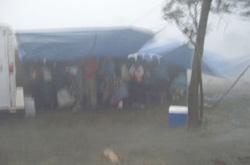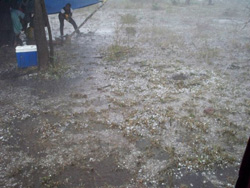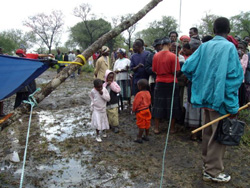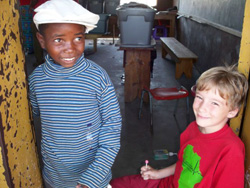Dear Luke Commission Team far from the Bush,
In recent days, two clinics stand out in particular. We are separated by 10,000 miles. Hopefully, though, before you’re done reading this update, you’ll feel like you were there, praying and participating in God’s “bush” vineyards.
And hopefully you will sense, “Oh, for the joy of it all…”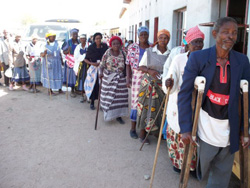
It’s Sunday. Usually we do not hold clinics on Sunday, but this bush community was fractured several years ago when a huge tract of land was sold to a private rancher, who kicked out all the Emaswati who lived there. These “displaced” people are still trying to recover – rebuild their huts and community, find a way to get their children to distant schools, and scratch out a living from dry barren soil.
So our clinic today is on Sunday. This enables school children to come for treatment, as well as adults who work during the week, and grandpas and grandmas who must walk long distances.

It’s a bright and sunny day, although clouds are full and billowy. We do not mind. The clouds offer us shade, just like the Israelites traveling in the wilderness. The only structure at this clinic site is an old army tent; we are grateful, however, since last year there was no shelter.

The Emaswati greet us with enthusiasm. We are long-lost friends, are we not? Also, the doctors are back, and that makes everyone jabula (happy).
Harry and Echo figure out the logistics. The eyeglass department will be in the tent, to protect the computer and 3,500 glasses from the wind that’s picking up. In another section of the tent is the HIV testing. The pharmacy will stay in the trailer, once it is unpacked and rearranged. The medical treatment and prayer center will be out in the open, under tarps strung between scrub trees and the trailer.

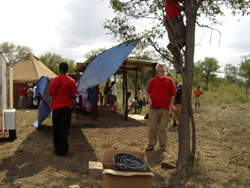
It’s certainly not unusual for The Luke Commission to improvise. It’s part of the thrill of watching God work. Maybe we will have to wait until dark to show the film.
Greeting, introductions, instructions, prayer, and an explanation that everything is free as a picture of Christ freely giving his life for us… Now the hustle and bustle begins.
A couple of hours pass. Emaswati wait in queue everywhere. Clouds still provide shade, but the wind is blowing dirt now. Clouds in Eswatini often do not contain rain, especially in these dry areas. But suddenly, the clouds spill out a surprise. Most stand still, enjoying a few refreshing sprinkles. Then it starts to pour.

Everyone is stunned. Emaswati withstand hardships we cannot imagine, but they’re not used to getting wet.
The rain comes in sheets, blowing sideward. Lightning and thunder crack in a cacophony. The tent collapses, so the computer and eyeglasses must be rescued.
Now the Emaswati move! They crowd under the tarp attached to the trailer, already packed with people waiting in the pharmacy line. For awhile, we continue to give out medications and explain how to use them. Then the noise from the storm dulls communication. All clinic operations stop. Corporate prayer ceases, but individual prayer increases.
It starts to hail. “What’s hail,” asks Duzy. “I’ve never seen hail. Frozen water? That’s why those little balls feel so cold.” Those little balls become the size of walnuts. And the rain and hail keep coming.
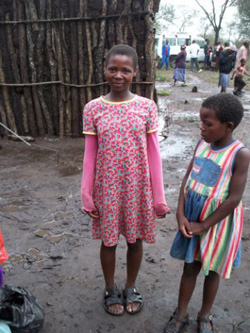
We are all soaked now, even under the tarp which is blowing in the wind and separating at the seams. The water starts to cover our toes and then creep up our ankles. Rain and dry soil makes mud, more and more mud.
Then the rain and hail stop as quickly as they began. The Emaswati smile and start talking at once. It’s all back to normal. Four phases of each mobile clinic resume – medical treatment, medication distribution, eyeglass diagnoses and selection, HIV testing and counseling. Only the 5th phase, the showing of The Passion, is still on hold.
Two hours later, God opens the skies once again. This time lightning strikes the ground all around us, thunder roars like a hungry lion. We learn the next day that four Emaswati nearby were killed by lightning.
Understandably, patients do not want to leave without their medicines. We just keep handing them out. Everyone is cold and muddy, rain running down cheeks and hair. One 56-year-old woman says, “I haven’t seen it rain like this since I was 4.”
We work in darkness two more hours, and the storm continues full force. Finally, we reach the last lady in the pharmacy line. She laughs when we greet her. Yes, she laughs, a true belly laugh. Clutching her little red bag full of medications, she says, “Thank you very much. May God bless you.”
Oh, and how He does. Some 447 Emaswati are treated that Sunday, and we arrived home safely despite Liswati predictions that the bridge we need to cross is washed away.
Another recent day, The Luke Commission travels to a school with 650 students high in the mountains. The principal here runs a tight ship; he’s ready for our return visit.
Harry and Echo treat the students first, so they can watch the Jesus movie and then walk home before dark. We also give all 650 students a new article of clothing or new shoes. Grins and shy smiles light up beautiful, young faces. Many are sick and hungry, but it’s not a day to dwell on problems.
Families and older Emaswati are everywhere, hundreds of them waiting, talking, wondering if they’ll be left out. When we assure them everyone will be treated before we leave, people relax. Now it sounds like a carnival or a large church picnic, minus the abundance of food.
The Luke Commission team switches into high gear. Working, working, working. Happy to be of service in the Master’s vineyard. Hours pass.
We meet a kombi driver, who all day has been ferrying Emaswati to our clinic site. We ask December Nxumalo why he is transporting people hour after hour.
“Last year when you came, some Emaswati thought they might die from your medications. Our traditional healers told us that. But those who came to the clinic found the medications were good. We thank our friends from outside the country for coming to make us stronger,” December says.
Other Emaswati thought the medications were weak and watered down because they were free, December explains. “Now we know that’s not true, and everyone wants to come here. The doctors listen and help us.”
It’s late, although we lose track of time after darkness descends. Let’s count the triage cards and see how many were treated. We count and count and laugh when we reach 889. Another 309 eyeglass cards are stacked next to the autorefractor. It’s the biggest day yet.
You can be certain you were there, because your prayers and your finances and your labors are the backbone of every clinic, of every Liswati who accepts Christ, of all that is done here in Jesus’ name.
Thankfully,
J. Tuinstra for The Luke Commission



